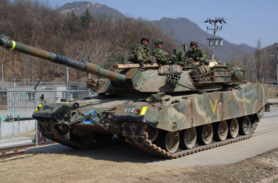South Korea Weighs Nuclear Armament
 To South Korea, North Korea’s nuclear threat seems more credible than ever. Pyongyang’s claim of successful hydrogen bomb test in January, followed by a long-range rocket launch, and a recent shutdown of the jointly operated Kaesong Industrial Complex, came as a wake-up call not only for military experts and government officials but also for the South Korean public.
To South Korea, North Korea’s nuclear threat seems more credible than ever. Pyongyang’s claim of successful hydrogen bomb test in January, followed by a long-range rocket launch, and a recent shutdown of the jointly operated Kaesong Industrial Complex, came as a wake-up call not only for military experts and government officials but also for the South Korean public.
According to a recent poll by Sungkyunkwan University in Seoul, the South Korean public rated its feeling of security about the North Korean issue on average 42.3 points out of 100. With 100 points representing the greatest feeling of security, a score of 42.3 point reveals the South Korean public’s heightened anxiety about the current inter-Korean relations and the prevailing fear of Pyongyang’s nuclear program.
With North Korea having performed its fourth nuclear test earlier this year, it seems unlikely that North Korea does not possess nuclear weapons. Experts on North Korea agree that the current military tension in the Korean peninsula poses serious threats. Nuclear weapons give Pyongyang unmatched military superiority and greater diplomatic leverage in inter-Korean relations. The North Korean economy’s heavy reliance on China decreases the effectiveness of both South Korea’s unilateral sanctions and the United Nations Security Council resolution to check the country’s aggressiveness.
As seemingly viable options have proven ineffective, conservative politicians in South Korea have begun seriously considering developing their own nuclear program. Chung Mong-joon, a former presidential candidate in 2002, suggested an option of withdrawing from the Non-Proliferation of Nuclear Weapons Treaty (NPT) and developing a nuclear program.
The floor leader of South Korea’s ruling Saenuri Party, Won Yoo-cheol, also called for nuclear armament during his speech at the National Assembly on February 15. “We cannot borrow an umbrella from a neighbor every time it rains. We need to have a raincoat and wear it ourselves,” Won said.
Politicians do not represent the only source of support for South Korea’s nuclear program. Cheong Seong Chang, a leading academic on North Korea and senior analyst at Sejong Institute, claimed that nonproliferation in North Korea has become “an unattainable goal” and that South Korea must change “the paradigm of national security” by developing a nuclear program. His argument represents a shift in South Korean academics’ thinking, which previously opposed nuclear armament.
The academics cite the potential economic savings of nuclear armament. Pointing out the high economic cost of the nuclear umbrella provided by the United States, Dr. Cheong argues that nuclear armament will greatly reduce military spending on weapon imports. Experts also worry about North Korea maintaining the upper hand in bilateral negotiations if Pyongyang were to see Seoul as irrelevant and explicitly ignore the country geopolitically because of its heavy security dependence on the U.S. nuclear umbrella. Finally, Dr. Cheong believes that relying on previous efforts such as propaganda broadcasts, economic sanctions, and U.N. Security Council resolutions has had only limited effects.
While South Korea’s call for nuclear armament may sound unrealistic, the nuclear threat posed to its national security seems more real than ever.
